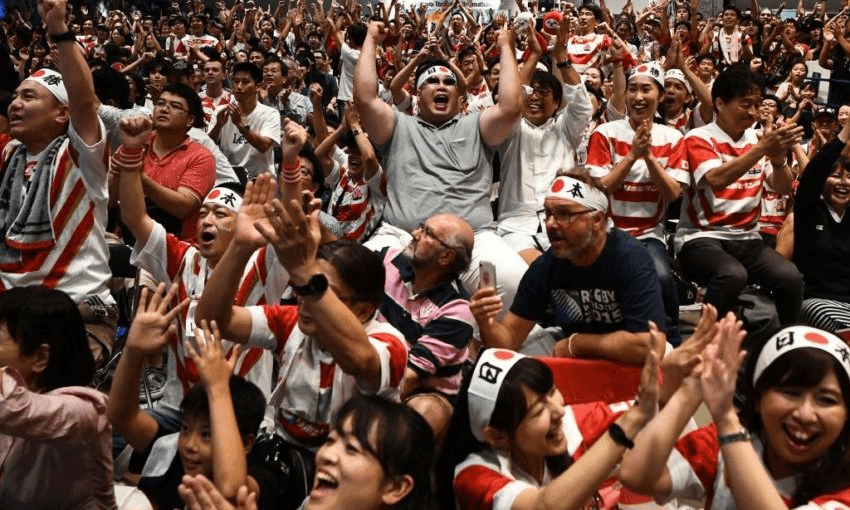What’s really stood out for me being back in Tokyo is Japan’s spectators, writes Richard Light, professor of sport coaching at the University of Canterbury.
I first noticed the unique qualities of the Japanese crowds when I was a rugby coach here in the 1990s. Later, with the admission of the Japanese team, the Sunwolves, to the Super Rugby competition in 2016, I saw it again. Although the Sunwolves struggled and were regularly at the bottom, or near the bottom, of the ladder, there was always a strong crowd of around 10,000 to 15,000 fans at every game.
They were always perfectly behaved and their enthusiasm never dropped, regardless of the score. Those qualities are in evidence again at the current Rugby World Cup and I am really delighted to see that Japan’s spectator culture has not changed. It still reflects much of the participatory and dignified Japanese culture.
I am now back here as an invited professor at Waseda University in Tokyo, conducting research with Japanese colleagues on changes in Japanese rugby coaching and, of course, following the progress of the team dubbed the “Brave Blossoms”.
Japan’s pool play win over one of the tournament’s most fancied teams, Ireland, confirmed that it is a real contender – a huge step up for Japanese rugby. The scenes at the stadium and later at venues around Japan showed just how profoundly Japan has embraced rugby. The atmosphere at the Japan win over Scotland was utterly phenomenal – a sea of red and white pulsating with the ebb and flow of the game.
Baseball has long been the dominant sport in Japan and football has boomed since the formation of the J League. Rugby has been a less popular and less known sport. It feels like that’s not changed.
I coached in the Japanese University Kansai A League for three years from 1990-1993 and then coached a high school team from 1993-1996 – and completed my PhD on high school rugby in Japan. In the 1990s university rugby, such as the classic Waseda versus Meij University clash, played soon after the Oxford versus Cambridge game in England, attracted the most attention, while an annual match between the champion company team and the champion university team was also a big event, but it always operated in the shadow of baseball and was overtaken by football after the introduction of the J-League.
Today, Japanese people I meet and chat with socially are all following their country’s progress in the Rugby World Cup. Many also now know the rules of rugby after an effective campaign to educate people about the game. The Japanese studiousness in getting up to speed so they can back their team was something to behold.
After the victory over Scotland, Japanese fans have their hearts set on going all the way to the final. It seems to me that every member of the Jamie Joseph coach side truly believes they can win the Cup. And their army of supporters appear to feel the same way. It’s an incredible state of affairs – unimaginable before the recent win, and reflected by the extraordinary atmosphere in the stadiums.
At Japan matches the stands are packed with supporters (and not all Japanese) in their red and white jerseys, holding up signs in Japanese and English, immersed in the match and living every moment. They joyously cheer for Japan and celebrate every break, try saving tackle, scrum and lineout win and every goal and try. They show no interest in antagonising rival supporters.
Japanese crowd never boo or remonstrate with referees’ decisions that go against their side. There is nothing aggressive. And never is there any of the ugliness of disgruntled fans inside or outside the stadium like that which plagues football.
Don’t get me wrong, the Japanese value winning as much as any fans, but there is an almost palpable respect for the opposition and the notion of fair play. This was exactly the same when I was coaching in Osaka more than two decades ago, with a strong belief in rugby as a vehicle for cultural and moral learning.
When a Japanese player is attempting to kick a goal the Japanese supporters are silent. They are silent, too, when the opponents are kicking for goal. Sportsmanship is highly valued.
Japan is a country of cultural festivals – matsuri – with mass participation. I have been lucky enough to participate in one in my wife’s family’s village in Wakahama. In the Aki Matsuri, or Autumn Festival, I was one of a dozen locals who carried a one tonne Mikoshi, a religious palanquin, from the east jinja (shrine) to the west jinja to celebrate the harvest. That involved many stops to rejuvenate with local sake.
At all local festivals everybody gets involved and I can’t help thinking that the huge crowds of Japanese jamming into stadiums at the World Cup, as well as all the festivities surrounding the games, are in effect forming a big matsuri.
This celebration even extends to watching matches in which Japan is not involved. Japanese spectators will wear the jersey of the team they support and join the festivity.
The atmosphere here is overwhelming – a resounding vindication of World Rugby’s decision to have a World Cup hosted in Asia. Its success is a tribute to the Japanese hosts, and may be remembered as a watershed in making the game a truly global sport.
Dr Richard Light is professor of sport coaching in the University of Canterbury’s College of Education, Health and Human Development.

